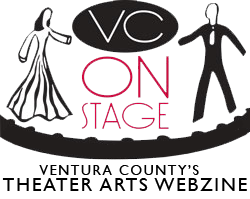A big part of theater is what is known as “improv,” acting sessions that help prepare actors’ reaction and thought process skills. Usually these are done behind the scenes, but in recent years, improv performance troupes such as Comedy Sportz have become as popular as rehearsed shows. The Conejo Improv Players is one such unit that staged two performances last Saturday at the Conejo Players Theatre. Its leader and on-stage host is Jeremy Zeller and we threw a couple of questions at Jeremy today so he could practice his improv skills on us in an interview.
VCOS: Let’s talk a little about the history of the Conejo Improv Players. How long has it been around and when did you get involved with it?
JEREMY: This is our third season but I’ve been doing improv for about ten years, on and off. Six years ago, a friend and I decided to start an improv troupe that would be like a volunteer thing where we’d go to homeless shelters, homes for abused and neglected kids, and perform comedy shows for free, just a give-back kind of thing. Then, when the board of the Conejo Players found out about that, they asked me to come out and teach improv classes, so we’ve been doing that for the past three years now.
VCOS: Why is improv important for an actor to know?
JEREMY: Well, part of live theater is the “live” part. You never know what’s going to happen. And when you’ve trained in improv, you can react organically in a moment even if you’ve heard a line a thousand times during rehearsal. So to be able to train yourself to react to the unexpected or the expected is key to acting, not just for comedy’s sake, but for dramatic action also.
VCOS: How does reacting to the unexpected make you expect it?
JEREMY: I think the key is you train yourself to never expect it, but to have an answer ready no matter what happens.
VCOS: Is this always done as humor?
JEREMY: No. You can take dramatic improv to stretch yourself and train your brain to direct and not to worry about what you might say, just to say it. The reason improv is used so much for comedy is the specific anticipation that there might be a spectacular failure of not knowing what’s coming or what’s going to happen. And that leads to a lot of areas where things can get very funny.
VCOS: Do you have personal experience of a spectacular failure in an actual performance where you had to rely on your improv skills to get through it?
JEREMY: I have been in shows where some of the people who I worked with don’t have a strong grasp of their lines as maybe I would like, so that is definitely an aspect of improv where you, as a performer, have to know the scene and where it’s going. So it’s up to you to think outside of the box and get everybody back on the same page.
VCOS: So it helps when you act as a leader on stage.
JEREMY: Yes. Absolutely. There is definitely a huge part of improv that is like being a director within a scene. If something goes wrong, you have the ability to lead the rest of the cast back to where you’re supposed to be.
VCOS: Can you give a couple of examples? Such as an actor forgetting a line or some kind of prop malfunction happening?
JEREMY: I was in a show five or six years ago where, ironically enough, I played a detective. We entered into this scene that was supposed to be really fast-paced, going back and forth, and the person who I was on stage with forgot the line that was supposed to launch us into that back-and-forthing. It was a key line because it wouldn’t have made sense without that introductory line. Without alerting the audience to the error, I had to ask a couple of questions to help that actor realize that they had made a mistake. As far as costume or prop malfunctions, the only one that I’ve been a part of was when I was off stage changing and had my microphone left on and said, “Oh, they won’t start without me” as the lights came up. Improv was not really going to help me there.
VCOS: The showcase that you did with Conejo Players last weekend focused on the “Two Detectives” sketch but you performed shorter exercises or games that involve improv. Did you develop those yourself?
JEREMY: There are a lot of games and scenes that are part of the general improv repertoire. Most of what we did, as far as short form stuff, is part of that, things you learn in classes or that you pick up along the way. We take those and adapt them in little ways that best suit our troupe. A lot of them rely more heavily on certain skills. We did a game called “Columns” where we have audience members come on stage and fill in a blank thrown at them by an actor. That focuses on the actor’s ability to justify anything that is said into the scene. So even if the person throws out the most outrageous thing that doesn’t make any sense, it’s up to the actor to figure out how to work that into the scene in a way that makes sense.
VCOS: I noticed a big difference between an actor who is familiar with and comfortable with improv and a random person from the audience who was often tongue-tied.
JEREMY: One of the things we stress in improv all the time is, “Say the first thing that comes into your head.” Pretty much no matter what. You’re trained not to think about what to say, you just say it. And once you have something out, you’re able to work with it into the scene. That’s a big part of being successful at improv – removing the filters that society has built up and just blurt out whatever comes into your head.
VCOS: So there’s really no way to prepare, is there?
JEREMY: Right. One of the other things we teach is “don’t plan.” Because you could plan out the best scene and all it takes is one word from somebody else to make that plan totally unrealistic. So there’s no point wasting time thinking of things because, more often than not, it’s not going to get used.
VCOS: Is that why you challenge yourself by using wild cards from the audience?
JEREMY: Yeah, it creates a challenge that stretches you, because we can practice that in a rehearsal but when it’s ourselves, we’re not as off the wall as somebody who is pulled at random from the audience.
VCOS: You participated in one yourself in the show, the one called “Late for Work,” where you had to guess reasons why you were late for work by quizzing three improv actors who had been briefed as to what reasons they were supposed to convey. That was really remarkable how you did that.
JEREMY: Thanks. That’s a hard skill to teach. You don’t want it to turn out to be just a guessing game.
VCOS: It almost seems like a game of Charades.
JEREMY: Yes, that’s definitely a big part of it. I rely a ton on the other actors communicating something to me so that I can understand it.
VCOS: Do you work with some of them regularly so that you get to know their styles or idiosyncrasies?
JEREMY: We do rehearse those but the way we structure our shows, we don’t do it in detail. We like to mix it up so everyone gets a chance to do the games they like. So we really just learn from each other as we work together.
VCOS: Sometimes a line comes out so beautifully it sounds prepared. There was one line that hit like that better than any other, and that was when Jonathan Rowsey asked Allie Leslie, who was playing a circus midget, what her name was, and Allie said “Christine.” And Jonathan responded quickly, “Can I call you ‘Chris’ for short?” That was absolutely brilliant.
JEREMY: (laughs) Sometimes you get a really easy softball and things just come to you.
VCOS: You live for those moments, don’t you?
JEREMY: Seriously! We had another moment like that in the second show, which is not exactly fit for print, but we couldn’t believe how perfect it was and I was pissed because I didn’t come up with it myself.
VCOS: Who is the best improv person you’ve worked with here?
JEREMY: He’s not really here much anymore, but Jeremy Hanna grew up around here doing shows – he works with Comedy Sportz now but he’s off the charts. He’s really good. Kyle Johnson is another one.
VCOS: Is there one word that best describes the feeling you have when doing improv?
JEREMY: The first word that comes to my head would be a “rush.” I don’t really think a lot when I’m on stage. That’s kind of a weird thing to say but when I’m up there doing a scene, I’m pretty focused on what other people are saying, but when it really gets inside my head is when I’m outside the theater waiting while they come up with stuff for me and all I hear is laughter from the other side of the door. That’s when I really get excited, and running in through the door to start the scene is really an incredible feeling.
VCOS: My guess was that the word would be “anxiety.” But that’s the word I’m feeling as a member of the audience watching what you’re doing.
JEREMY: I hear that a lot. People tell me all the time, “I could never do that.” But I tell them that it’s not that bad. Once you learn the rules and you actually practice these things, I think pretty much anybody can do improv.
********************
The Conejo Improv Players includes Danica Dawn Coble, Christopher Carlson, David J. Parmenter, Allie Leslie, Scott Shrum, Frank Bonoff, Jaden Ostrove, Alexandra Menna, Kevin Schultz, and Jonathan Rowsey.






No Comments